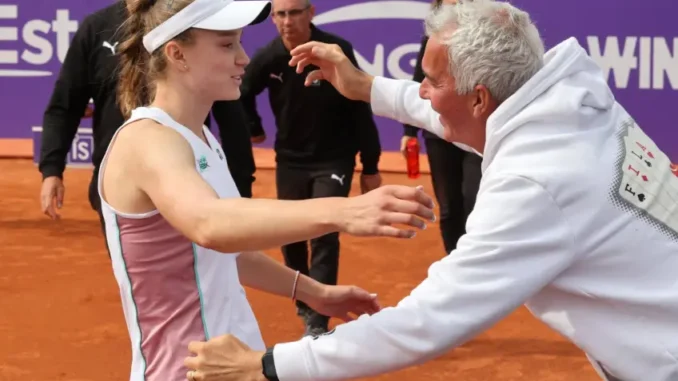
Elena Rybakina, the 2022 Wimbledon champion, has faced a whirlwind of challenges in 2025, from coaching controversies to a dip in form that saw her slip outside the WTA top 10. Amid this turbulence, her new coach, Davide Sanguinetti, has stepped into the spotlight, bringing a fresh perspective and ambitious goals to her team. The 52-year-old Italian, a former world No. 42 with a wealth of coaching experience, joined Rybakina in February 2025 following a dramatic fallout with Goran Ivanišević and the ongoing suspension of her longtime coach Stefano Vukov. In a candid interview, Sanguinetti shared his honest approach to coaching the 26-year-old Kazakh star, emphasizing a sensitive yet driven strategy to unlock her vast potential and propel her to the world No. 1 ranking by 2026.
Sanguinetti’s arrival came at a critical juncture. Rybakina’s decision to rehire Vukov in January 2025, after parting ways with him in August 2024, sparked controversy when the WTA suspended Vukov for a year due to alleged breaches of their code of conduct, including claims of mental abuse and inappropriate comments. The move blindsided Ivanišević, who had joined Rybakina’s team in late 2024, expecting to be her sole coach. After a fourth-round exit at the Australian Open to Madison Keys, Ivanišević parted ways with Rybakina, paving the way for Sanguinetti to step in. Reflecting on the complex dynamics, Sanguinetti addressed Vukov’s role, saying, “Vukov and Elena are close, he will always be there. Stefano and I talk a lot, we are on the same wavelength. It’s not a problem to have two coaches, it’s almost a trend now.” His pragmatic acceptance of Vukov’s off-court involvement, despite the suspension, highlights his focus on maintaining team harmony while prioritizing Rybakina’s growth.
Unlike his previous roles coaching ATP players like Vince Spadea, Go Soeda, and Brandon Nakashima, Sanguinetti has had to adapt his methods for the WTA tour. “There are differences, of course,” he admitted. “I would say that with the girls, you need to be a bit more sensitive, you need a different approach to communicate and address things. In my case, I am still new, learning and adapting to each tournament that passes.” This sensitivity is crucial for Rybakina, whom he describes as a player with immense potential that has yet to be fully realized. “We already knew each other, we talked, she’s a player I really like: I’ve always been fascinated by her game. In my opinion, she should have won more, especially at Slam level: someone like her can’t be satisfied with winning Wimbledon in 2022,” he said, echoing his belief that Rybakina’s powerful serve and aggressive baseline play could dominate the tour.
Sanguinetti’s vision for Rybakina is ambitious yet methodical. “At the moment I’m a sort of ferryman: I joined her team in February, without any work behind me. She explained more or less what she had been doing, and I proposed a two-year collaboration because I have my own working method: in the first year I would like to maintain the status quo, maybe finish at number 6 in the rankings, and next year I would like to take her to number one in the world: she has all the potential,” he declared. This roadmap reflects his confidence in Rybakina’s ability to reclaim her career-high No. 3 ranking and surpass it, building on her 2025 Strasbourg title and semifinal runs in Dubai and Montreal, where she advanced after Marta Kostyuk’s retirement in the quarterfinals.
Rybakina’s season has been a rollercoaster, with health issues and coaching changes disrupting her rhythm. Early losses to Ashlyn Krueger in Miami and Elina Svitolina in Madrid exposed vulnerabilities, but her clay-court triumph in Strasbourg and a competitive French Open fourth-round loss to Iga Świątek showed resilience. Sanguinetti’s role is to address these physical and mental challenges, particularly after a 2024 season marred by injuries. “It’s a new adventure that I’m taking on with a lot of passion and desire to do well, there’s more pressure because you have to win, but I really like this,” he said, embracing the high stakes of coaching a Grand Slam champion.
As Rybakina prepares for her Canadian Open semifinal against Victoria Mboko, Sanguinetti’s influence is evident. His collaborative approach with Vukov, who remains in contact during training blocks in Dubai, ensures continuity, while his sensitive coaching style aims to unlock Rybakina’s mental and physical potential. Former world No. 1 Dinara Safina, whom Sanguinetti coached in 2011, praised his empathetic approach, saying, “He always tries to understand the player, which is important as a coach.” With Sanguinetti’s guidance, Rybakina is poised to chase another Grand Slam and the world No. 1 spot, proving that her 2022 Wimbledon victory was just the beginning of her ascent.
Leave a Reply